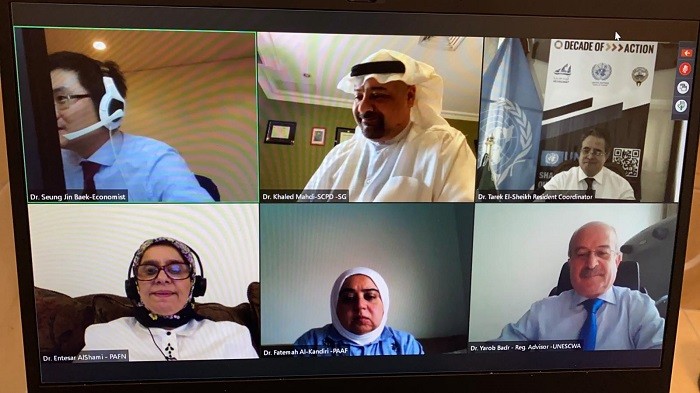Dr. Khaled Mahdi Secretary General of Supreme Council for Planning and Development. My colleagues Dino Francescutti, RD for Gulf FAO and FAO guest speakers, Umran UNOPS Regional Hub Director Amman and UNOPS guest speaker and Dr. Yarob Regional Advisor Economic commission for West Asia. Distinguished Ambassadors and heads and members of Diplomatic missions and Un colleagues, dear participants. Good afternoon.
The world is facing a hidden enemy the COVID19 Pandemic, It affected more than 4 million killed more than 311 thousand worldwide. This dictated full lockdown of borders, cities and disrupted economies, closed schools, increased unemployment, closed ports and airports. It’s seriously affecting supply chains of goods food and essentials and dictated a new normal. We are putting health and safety first while trying to respond to the impact of precautionary measures on economy, trade, food and basic needs production, logistics and transport as well as managing an emergency social safety net. We must ensure that essentials flow during tough measures to deal with the Pandemic are leaving no one behind and that those most vulnerable and who lost their income have food on the table, medication for their health and basic assistance service (be it health care, social care or continuing education).
In countries that rely mostly on food imports, such worldwide restrictions mainly in logistics and transport as well as reduction in processed food production, due to lockdown and safety measures on workers. Have a serious impact on securing longer term flow of supplies. This requires strategic response planning and systems of information and market monitoring of supply, demand and shortages coupled with serious revision of national agriculture and crop production strategies, policies.
Also requires plans to reform the farming (including livestock and fisheries) industries and ensure that financial incentives and economic measures as well as servicing solutions are set in place to put non-productive farms into the production cycle and establish new productive ones, this apply equally to staple commodities and high-value commodities’ production, livestock and fisheries, which is labor intensive. Also, food processing plants and food distribution center that are labor intensive will requires very strict health and safety measure for its workers who are mostly expats to continues safe and healthy production and distribution. We have seen the increased infection among cooperative workers in the past week.
Utilizing digital technologies for organizing and managing access to food and medicine is an important tool to manage the supply and demand and put order to excessive consumption but could deprive senior citizens and those who are within the lower income categories with limited access to such service to acquire their basic needs. Hence, the supply chain management strategy and response plan will essentially take in consideration different solutions, options and alternatives for monitoring the global and local markets, manage transport and logistics, ensure financial support and incentives to local farmers and processed food producers and manage social safety nets for the most vulnerable population employing various forms of partnerships with NGOs and cooperatives that should be effectively managed by a globally, regionally and locally networked Supply Chain Management Center with real time data from ports to storage and retail employing artificial intelligence and the good digital information and infrastructure base.
The UN has set guidelines and tools that address the above challenges and respond to the mentioned solutions and within this new world situation where most member states has looked inward to deal with its local challenges evolving from pandemic, the United Nations put all its efforts and multilateral capacities in global solidary to have unified and coordinated response that ensure no one is left behind
I look forward to the effective exchange between our key speakers today from Authorities in Kuwait and UN experts and distinguished participants.
Tarek El-Sheikh
United Nations Resident Coordinator
Speakers:
Dr. Dalal Rajab
Deputy Director
Public Authority for Agriculture & Fisheries
Dr. Saleh AlOqaili
Asst. Undersecretary Ministry of Commerce and Industry
Dr. Entesar Alshami
Director, Food Security
Dept. Public Authority for Food & Nutrition

